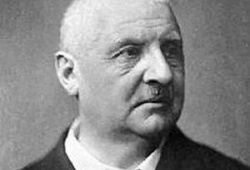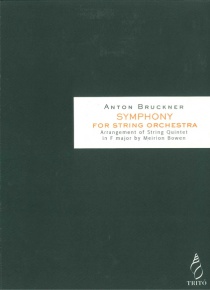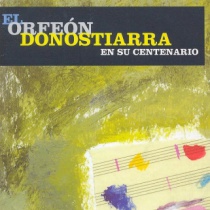
He was the son of a village schoolmaster and organist, with whom he first studied. His father died in 1837 and he was sent at 13 as a chorister to the St. Florian monastery where he could study organ, violin and theory. He became a schoolmaster-organist, holding village posts, but in 1845 returned to teach at St. Florian, becoming organist there in 1851. During these years he had written masses and other sacred works. He continued his studies almost to the age of 40, but more crucial was his contact, in 1863, with Wagner’s music - first Tannhäuser, then Tristan und Isolde; these pointed to new directions for him.
In 1868 he was offered the post of theory teacher at the Vienna Conservatory, which he hesitantly accepted. In the ensuing years he travelled to Paris and London as an organ virtuoso and improviser. In Vienna, he concentrated on writing symphonies; but the Vienna Philharmonic Orchestra rejected Sym. 1 as ’wild’, Sym. 2 as ’nonsense’ and ’unplayable’ and Sym. 3 as ’unperformable’. He was criticized for his Wagnerian leanings and his friends urged him to make cuts in his scores (or made them for him); his lack of self-confidence led to acquiescence and to the formal distortion of the works as a result. Late in his life he revised several of his earlier works to meet such criticisms.
Bruckner taught at a teacher-training college, 1870-74, and at Vienna University from 1875. Only in the 1880s did he enjoy real success; his music began to be performed in Germany and elsewhere, and he received many honours as well as grants from patrons and the Austrian government.
Bruckner was a deeply devout man, and it is not by chance that his symphonies have been compared to cathedrals in their scale and their grandeur and in their aspiration to the sublime. The principal influences behind them are Beethoven and Wagner.
In 1868 he was offered the post of theory teacher at the Vienna Conservatory, which he hesitantly accepted. In the ensuing years he travelled to Paris and London as an organ virtuoso and improviser. In Vienna, he concentrated on writing symphonies; but the Vienna Philharmonic Orchestra rejected Sym. 1 as ’wild’, Sym. 2 as ’nonsense’ and ’unplayable’ and Sym. 3 as ’unperformable’. He was criticized for his Wagnerian leanings and his friends urged him to make cuts in his scores (or made them for him); his lack of self-confidence led to acquiescence and to the formal distortion of the works as a result. Late in his life he revised several of his earlier works to meet such criticisms.
Bruckner taught at a teacher-training college, 1870-74, and at Vienna University from 1875. Only in the 1880s did he enjoy real success; his music began to be performed in Germany and elsewhere, and he received many honours as well as grants from patrons and the Austrian government.
Bruckner was a deeply devout man, and it is not by chance that his symphonies have been compared to cathedrals in their scale and their grandeur and in their aspiration to the sublime. The principal influences behind them are Beethoven and Wagner.
Publications (2)
Anton BrucknerAll the products
Anton Bruckner



